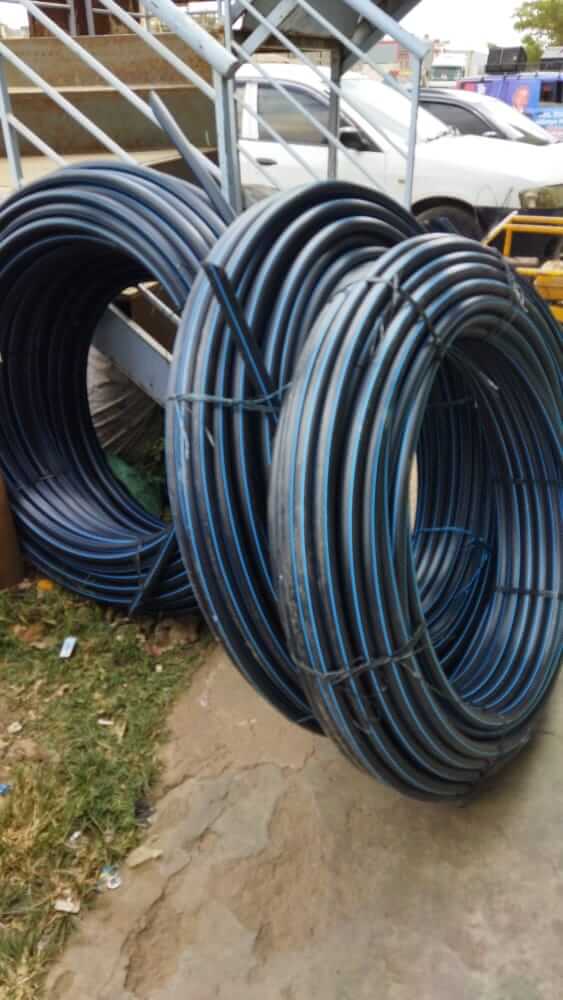HDPE Pipes for Irrigation

HDPE Pipes for Irrigation are high resistance, flexible, and long-lasting pipes used for irrigation and water conveyance. In Kenya, we supply HDPE pipes and fittings for use in telecommunication conduits, irrigation, gas, and sewage systems. HDPE pipes are strong and durable. To make our HDPE pipes in Kenya, we use UV-stable high-density polythene materials. These high-density pipes are applicable for irrigation as well as piping industrial liquids such as water, oil, and other fluids. Aqua Hub manufactures and sells HDPE pipes with varying wall thicknesses and lengths of up to 100 meters.
What are the benefits of HDPE Pipes for Irrigation?
Polyethylene is used to make HDPE pipes. This material provides the pipes with distinct features that result in advantages, and these advantages have led to the adoption of polyethylene pipes. The pipes are lightweight when you compare them to iron or galvanized pipes. These versatile and reliable pipes are impervious to corrosion and chemicals. They are available in a wide range of sizes, colors, diameters, and lengths. Some of the advantages of using HDPE pipes for irrigation are as follows;
- Long-term reliability and the safety of potable water
- Resistance to corrosion and deposits
- Flexibility to make installation easier.
- Freeze-break resistance
- Portable and lightweight.
- The low scrap value discourages theft on the job site.
- Worksite installations demand durability and hardness.
- There is no need of flame to attach, and there are several fitting and joining options.
- Material that is recyclable and ecologically beneficial.
- Heat fusible for almost leak-free operation

What are the uses of HDPE pipes?
HDPE pipes are known for being lighter than iron or galvanized pipes. These versatile, reliable pipes feature unsurpassed chemical and corrosion resistance. The pipes are available in a range of sizes, colors, diameters, and lengths. Buried electronic or communications cables in HDPE pipes, as opposed to aerial wires, can endure extreme weather, wildlife, vegetation, automobiles, and vandalism.
They are easy to move and install due to their small weight. These pipes are also easy to repair since a broken part of the tube may be simply taken out and a new pipe joined through both ends. The motion is known as butt fusion. Rusted and damaged galvanized iron may only be replaced. As a result, galvanized steel pipes are more expensive to use in the long run.
In a nutshell HDPE Pipes are used in the following areas;
- Urban water supply system.
- Landscaping water supply network.
- Oil and gas flow, gas drainage system.
- Dredging pipeline engineering (sand sediment transport).
- Underground firefighting system.
- Cable covering (HDPE conduit).
- Tunnel escape and ventilation engineering pipelines.
- Industrial raw material conveying pipe network, industrial sewage discharge.
- Fields of farmland irrigation and aquaculture projects.
What are the sizes and cost of HDPE pipes?
These HDPE pipes are used in agriculture, and their length is standard up to 90mm; beyond that, it depends on the pipe diameter. With pressure gauges ranging from PN6 to PN25, Aqua Hub HDPE Pipes are offered in sizes from 16mm to 800mm. In a nutshell, HDPE pipes are available with pressure gauges ranging from PN6 to PN25 and diameters ranging from 16 mm to 800 mm. They come in rolls that range in diameter from 20 mm to 110 mm.
Depending on the size, length, and weight of the pipe, the cost of HDPE pipes can range from Ksh 1500 to Ksh 33,000. PN6 to PN16 are the price points.
| Size | Price |
| 16mm | 1,500 |
| 20 mm | 2,500 |
| 25 mm | 2,800 |
| 32 mm | 4,800 |
| 40 mm | 7,000 |
| 50 mm | 10,000 |
| 63mm | 15,000 |
In Kenya, Aqua Hub offers the best irrigation pipes for sale and maintenance. The best HDPE pipes are available in Kenya. We are the leading supplier of HDPE pipe in Kenya. A range of HDPE pipe connections are offered with HDPE pipes for sale. Call us at 0790719020 in Nairobi or 0759372241 in Eldoret.
